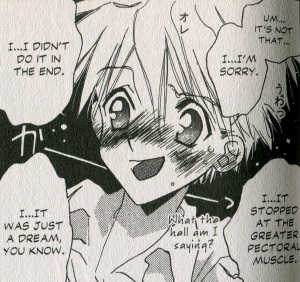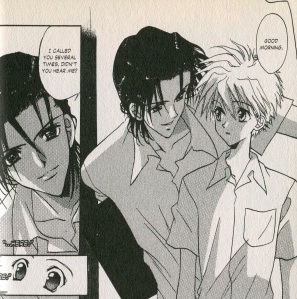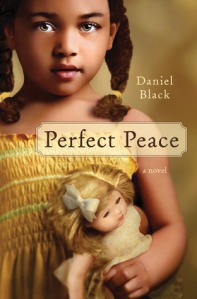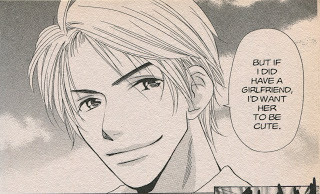I have a humble collection of manga, so this will be a modest series of posts (not really). Nevertheless, my manga library was a lot larger in the past, but many of the titles that I decided not to venture pass book one (unless it was a one-shot) did not make it during years of moving and rearranging cluttered bookshelves. In retrospect, I wish I kept many of them because I fume silently at the absence of my copy of Antique Bakery Volume 1. Did I give it away? Or did I misplace it in my mess? It always seems to work that way: you grow out of certain phases then you tumble your way back in. One year my manga library grows, the next year it’s stagnate, the following year it’s dwindled. And on it goes.
Nonetheless, there are a few manga series and one-shots that I refuse to separate from. Some of them I’ve completed and some of them I hold on to in the hopes of one day picking back up to complete. Naturally, the other singular element that assists with my decision to hold on to a title is the artwork.
So with all of that said, let’s get into Manga Realness Number One. By the way these are not ranked; alphabetically arranged with each category, though. With Sailor Moon completely out of the way (what manga series can beat that?), my first favorite completed manga series is Yuu Watase’s Absolute Boyfriend.
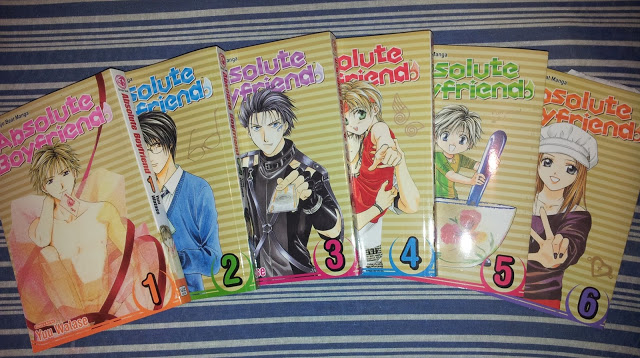
Absolute Boyfriend is about a withdrawn Japanese high school girl (she happens to live alone while her parts work overseas) named, Riiko Izawa, and like many shojo genre girls, Riiko is having romantic problems. Well, Riiko’s problem is that she can’t seem to have a romantic problem. Guys that she's interested in are never receptive to her. When it finally appears that she will remain loveless throughout her school years, a strange set of circumstances, involving her returning a missing cell phone, sets Riiko on the path to finding love. Or does it? It is nowhere near as easy to determine. The missing cell phone belongs to a mysterious stranger who, after listening to Riiko’s romantic woes, offers her a card and CD-ROM that directs her to a website called Kronos Heaven. It is here that Riiko spends a late school night customizing what appears to be her perfect boyfriend, offered for order by Kronos Heaven. While she approached much of this as a joke, the next day Riiko receives her wish in the form of the perfect, robotic boyfriend named, Night (he is part of the Nightly Lover android series). Per the instructions, a kiss is required to activate Night. With Riiko ready to comply, this is where the fun of the 6 volume manga series begins!
 |
| Riiko Izawa |
Night is given to Riiko on a trial basis; he must be returned three days after purchase. The mysterious cell phone stranger reveals this to Riiko during his service-appreciated visit. The problem is that Riiko wasn’t aware of the statement, and is therefore stuck with Night and a one million dollar (or yen) bill. With her first payment only days away, Riiko and Night quickly devise ways to earn money, including working in a hostess bar. Night even disguises himself as a woman to assist Riiko; such a dedicated fellow him be. Until Riiko is groped by a drunk patron does Night come out of his wig to protect her, subsequently leading to both of their terminations from the bar. Leaving the bar broke, they run into the mysterious cell phone stranger. Realizing her struggles, he offers Riiko a deal: the organization will waive her fee if she provides them with data concerning her relationship with Night. This will assist the company in creating even better boyfriend models for future customers. Gladly, Riiko agrees. She is determined to teach Night everything about women.
It all makes for a great set-up, especially when you factor in the antics the two go through to keep their secret, as well as their comedic dialogue. Other elements that unfold within the series includes the crush Riiko’s neighbor, Soshi, has on her. This eventually forms a love triangle between the three where Night and Soshi battle it out for Riiko’s attention and affection. Other characters join in on the adventures, including a miniature version of Night who assists Riiko during a time when Night requires repairs to his cyborg body. Nevertheless, the main focus of the series revolves around Riiko’s maturity and choice. With a sudden brew of romantic options, will she choose the robotic boyfriend, Night? Or will she choose the moody and flawed human character, Soshi?
 |
| Night. The robot mate. |
Without a doubt, this manga series contains many of the elements that I love in manga. That's one reason I loved it so much (other than the hilarious plot). I read the volumes as each English adaptation was released (2006-2007), so it came along as a positive distraction from the mundane life I faced working my ass off to keep up with bills and rent in a city three hours away from home. I can distinctly remember reading volume three while gassing up my car for a trip to Six Flags (needed that break). So why was I so invested in the series? Because Riiko was so terribly unsound when it came to figuring out her love life, and for good reason when you consider she resorted to a robot to try to fulfill that void. I could relate to her in that aspect--not the robot nonsense. I knew what it was like to wonder why certain tingling elements revolving around relationships and finding love did not seem to operate correctly in my own life. I, too, like Riiko, spent a lot of time swallowing down the interest in place of accepting my solidarity. But at the same time I longed for companionship. You begin to adapt this armor where you stress to others that connections and relationships are not needed in your life, meanwhile you watch the relationships of others blossom and secretly ask yourself what is so wrong with you. Now, I wouldn’t dare pay someone to be the “absolute mate”, but I know what it’s like to struggle in finding answers to your questions without endangering the integrity and self-respect that makes up yourself. Even if those two things are the very things that get in your way.
Check out Absolute Boyfriend Volume 1 on Amazon.com and look out for Doubt!! by Kaneyoshi Izumi.
